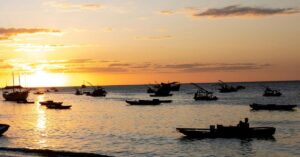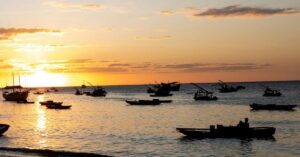
Indian Navy Set To Issue ₹80,000 Crore Tender For 4 Large Amphibious Warships
September 22, 2025
U.S. And UK Sign Landmark Agreement On Civil Maritime Nuclear
September 22, 2025

Spanish authorities have arrested 19 people suspected of murdering dozens of migrants on a dangerous voyage from Senegal to the Canary Islands.
Survivors told police that the smugglers tortured passengers, beat them, and deliberately threw at least 30 people overboard, while refusing to help those who accidentally fell into the sea.
The wooden pirogue, about 20 meters long, set sail from Senegal in August carrying roughly 300 passengers seeking asylum in Europe. After an 11-day journey, the Spanish coastguard vessel Guardamar Urania rescued 248 survivors off Dajla, near southern Morocco (Western Sahara), and brought them to Gran Canaria on August 24. One of the rescued later died in hospital.
Survivors identified the 19 suspects as the organisers of the voyage. Witnesses reported that smugglers accused certain passengers of being “witches” responsible for engine failures, food shortages, bad weather, or other misfortunes during the crossing.
Those targeted were thrown into the sea alive. Others were attacked simply for protesting or disagreeing with conditions on board. Authorities estimate that at least 50 people died or went missing, including the 30 deliberately thrown overboard.
Spanish police said the suspects face charges of murder, bodily harm, torture, and assisting illegal immigration. Most of the 19 arrested are Senegalese nationals, with at least one from Gambia. They were detained after being held in migrant centers in the Canary Islands.
The journey from West Africa to the Canary Islands is widely regarded as one of the world’s deadliest migration routes. Migrants face a northerly voyage of roughly 1,000 nautical miles across the Atlantic Ocean, often in overcrowded wooden boats.
According to aid group Caminando Fronteras, around 10,000 people died attempting the crossing in 2024. In 2024, a record 46,843 migrants reached the Canary Islands by boat, with estimated deaths ranging from 1,000 to 10,000.
Spain’s naval chief, Admiral General Antonio Pineiro, said the government focuses on search and rescue operations rather than pushback measures. “We’re not here to fight the cayucos, but to help them,” he told local media.
This year, 23,583 migrants have reached Spain in small boats, about 10,000 fewer than in the same period last year. The West Africa–Atlantic route remains the busiest, with 12,487 arrivals in the Canaries so far in 2025. Despite the lower numbers, the crossing remains extremely dangerous, with thousands of deaths in previous years.
References: telegraph, scottishdailyexpress
Source: Maritime Shipping News


